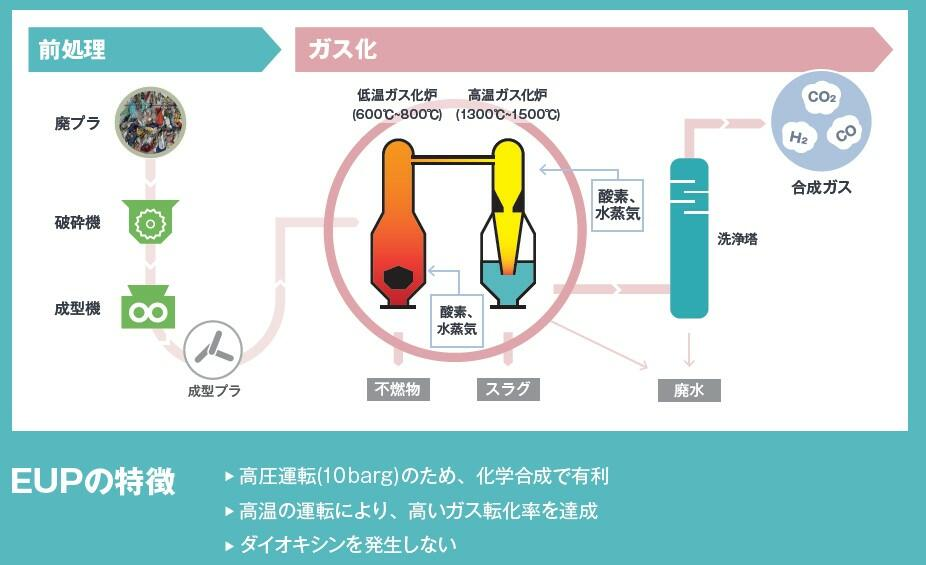

JGC: Toward waste plastic and gasification recycling in South Korea: Conducted commercialization survey
2021/01/18
JGC Holdings:
JGC Global has received an order for commercialization research work toward the realization of Korea’s first waste plastic gas recycling plant.
Waste plastic gas recycling plant:
This project is by JGC Global
From more than a dozen waste plastic sorting facilities in South Korea
Collecting films and plastics that are difficult to recycle,
Utilizing EUP * to turn waste plastic gas,
We will carry out a commercialization survey related to the construction of the plant.
We plan to summarize the survey results in the first half of 2021.
Waste plastic disposal situation in South Korea:
Currently in South Korea
High-purity plastic waste:
“Plastic waste made of a single material with high purity such as PET bottles, polyethylene, polypropylene, etc.” is washed.
Residual plastic containing impurities:
However, “recycled mixed films and residual plastics containing different materials and impurities” are difficult to recycle and are currently landfilled or incinerated.
Building a mechanism for reusing these resources is an urgent issue in South Korea.
EUP (Ebara Ube Process):
EUP can decompose “mixed films and residual plastics that have been considered difficult to reuse” at the molecular level.
It greatly contributes to the promotion of resource recycling.
Syngas produced from gasification equipment:
It can be used as a low-carbon hydrogen by substituting raw materials for chemical products and refining.
This treatment method contributes not only to a recycling-oriented society but also to the realization of a hydrogen-based society.
Overview of EUP:
EUP (Ebara Ube Process) is a technology developed by Ebara Environmental Plant and Ube Industries.
Waste plastic with oxygen and steam
Gasified by partial oxidation,
The process of producing syngas that can be used for chemical synthesis.
Showa Denko’s Kawasaki Plant:
Since 2003, the Showa Denko Kawasaki Plant has been operating a gasification facility that uses EUP (annual processing amount of waste plastic, 70,000 tons).
It is the only gasification chemical recycling in the world and continues long-term commercial operation.
2021 News Release | JGC Holdings
https://www.jgc.com/jp/news/2021/20210118.html
Chemical recycling: Used plastic becomes EV energy!
“Plastic resource recycling” demonstration project started in Kawasaki City, Showa Denko, McDonald’s Japan |
November 30, 2020
Kawasaki City,
Showa Denko,
McDonald’s Japan
We will implement initiatives for the realization of a sustainable recycling-oriented and carbon-free society.
Used plastic:
Used plastic discharged from eight McDonald’s stores in Kawasaki City will be recycled to low carbon hydrogen at Showa Denko’s recycling facility located in the Kawasaki coastal area.
For the energy of EV bikes:
In addition, it will be recycled into the energy of EV motorcycles used in the McDelivery service of McDonald’s Kawasaki Minamikase store.
The demonstration project will start on December 1st (Tuesday).
News Release | Showa Denko KK
https://www.sdk.co.jp/news/2020/39350.html
JGC Receives Order for Feasibility Study toward Realizing South Korea’s First Plastic Waste Gasification Recycling Plant
This project
involves carrying out a feasibility study relating to the construction of a plant for achieving plastic waste gasification recycling (with a capacity of several hundred tons a day)
by utilizing EUP*,which JGC Group holds the relicensing right to.
The plastic
will be gathered from plastic waste sorting facilities in a dozen or more locations in South Korea, and will comprise mixed films and the plastics that remain after sorting, which are challenging to recycle.
The results of the feasibility study are scheduled to be compiled by around first quarter of 2021.
Currently in South Korea,
single-material plastic waste with a high degree of purity such as PET bottles, polyethylene and polypropylene
are recycled using cleaning treatments and similar mechanical recycling methods.
However, because of the difficulties in recycling mixed films and residue plastics, which contain a variety of materials and impurities,
they are currently disposed of at landfills or by incineration.
Consequently, building a framework for reusing these resources is a pressing issue within South Korea.
News Releases 2021 | JGC HOLDINGS CORPORATION